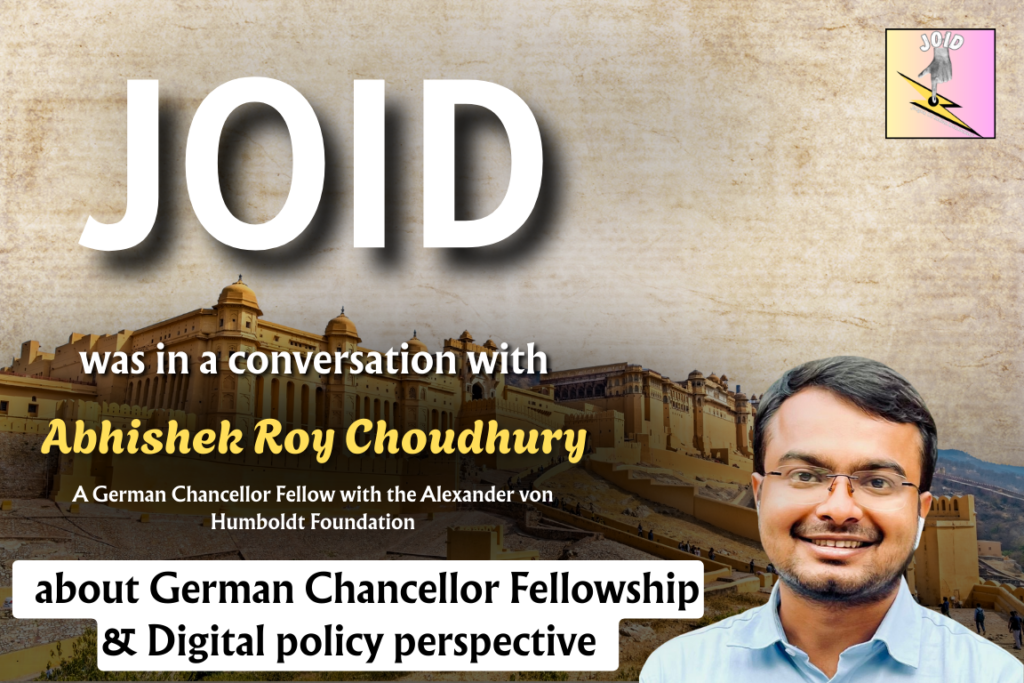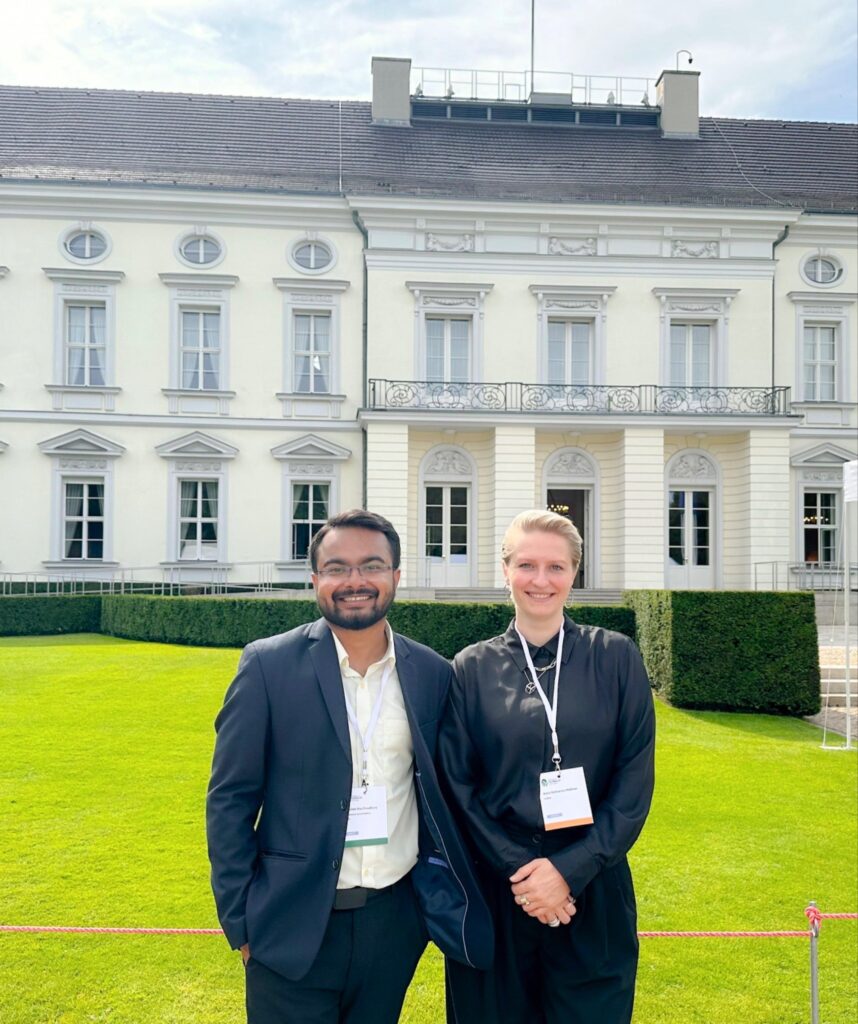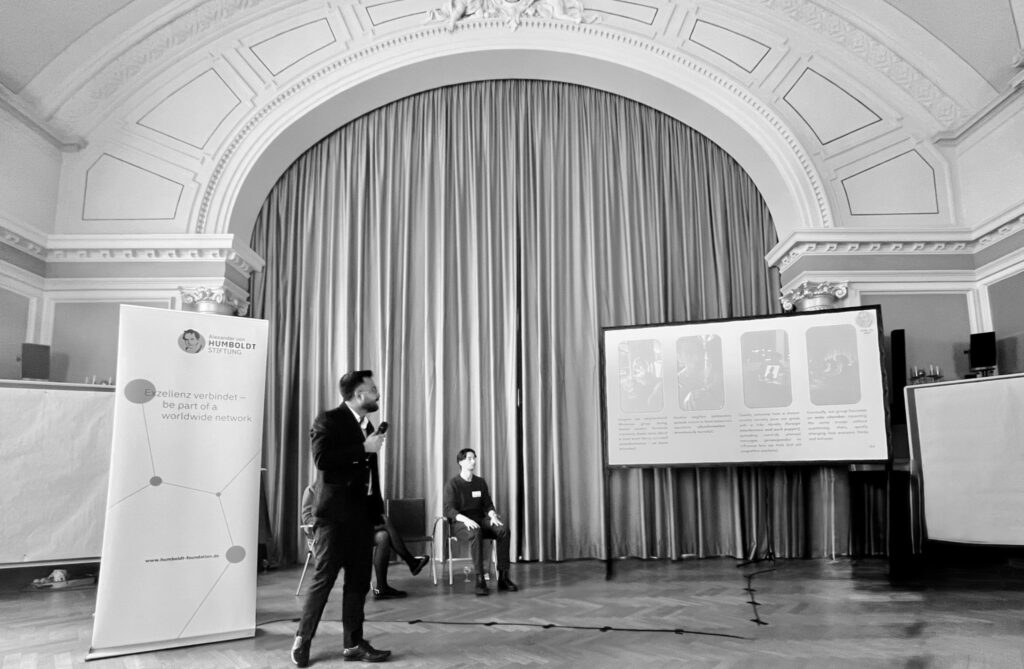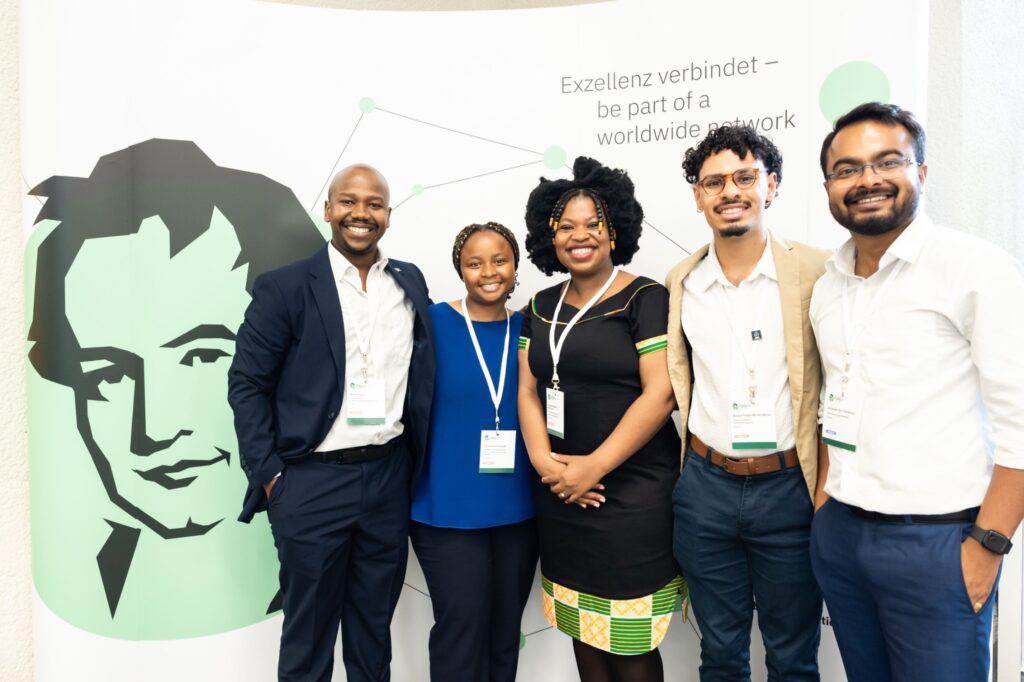
In this interview we discussed at length about Global south’s positioning in the eyes of Global North, Contemporary digital policy and the German Chancellor Fellowship. Abhishek Roy Choudhury, a German Chancellor Fellow with the Alexander von Humboldt Foundation, shares insights from his fellowship. Representing India and hosted at the Konrad Adenauer Foundation in Berlin, after a start at the Institute for Strategic Dialogue, Abhishek’s research focuses on Indo-German digital cooperation and EU-South Asia digital policy alignment, particularly addressing disinformation and foreign information interference. His work has been featured in prominent Indian outlets like The Hindu, The Indian Express, and The Telegraph. We explore how international exposure can strengthen Indian policymaking, the dynamics of brain drain, and Global South–Global North relations. With over six years in political research and strategic communications, Abhishek has collaborated with senior Indian government officials, political leaders, and industry stakeholders. He served as a Consultant at KPMG India’s Government and Public Services practice and as a researcher in the office of the Cabinet Minister at India’s Ministry of Environment, Forest, and Climate Change. Beginning his career with the Indian Political Action Committee, he holds a Post Graduate Diploma in Management (Marketing and Media Communications) from Pune Institute of Business Management and a Bachelor’s in History from Jadavpur University, Kolkata. Abhishek also co-founded “Food for Famished,” a volunteer initiative supporting hundreds in West Bengal during the COVID-19 pandemic.
Tell me something about what the German Chancellor Fellowship is and what inspired you to pursue it?
The German Chancellor Fellowship is a prestigious, fully-funded year-long program by the Alexander von Humboldt Foundation, allowing young professionals from India, Brazil, China, South Africa, and the US to conduct a self-designed project in Germany. It includes a stipend, travel expenses, insurance, and intensive German language training. I pursued this fellowship to broaden my international perspective on public policy, particularly inspired by Germany’s efficient governance and strong institutions. The opportunity to independently design my project, interact with German policymakers, and gain insights to bring back to India made this a unique professional and personal growth experience.
What was your experience during the fellowship like, and what did you work on in Germany?
The fellowship year has been intense and rewarding, providing me with invaluable international exposure. During the first seven months, I collaborated with the Institute for Strategic Dialogue (ISD), focusing my research on disinformation and Foreign Information Manipulation and Interference (FIMI). This involved analyzing how digital platforms are exploited to influence political narratives and undermine trust in democratic institutions. My work entailed extensive data analysis, stakeholder interviews, and developing policy recommendations to counteract these challenges effectively. Currently, I am continuing my fellowship at the Konrad Adenauer Stiftung (KAS), where my project centers on digital policy cooperation between India and Germany. At KAS, I am exploring regulatory frameworks, platform governance, and cross-border digital policy alignment between the two countries. This includes studying best practices in digital regulation from Germany that can inform policy development and governance strategies in India. A significant highlight of the fellowship has been engaging in structured events organized by the Alexander von Humboldt Foundation. These included an opening conference, an Annual Meeting of the Humboldt Foundation, and visits to institutions like the Federal Chancellery in Berlin. Such experiences allowed me to interact closely with German policymakers and build a global peer network passionate about digital policy and governance. This type of fellowship also sharpens adaptability and intercultural competence. Working and communicating in a German-office environment enhances immersion, enabling deeper engagement with local stakeholders and experts. Overall, my fellowship journey has been significantly shaping my perspective, equipping me with advanced skills, practical insights, and a robust network of international collaborators, all of which I aim to leverage to strengthen digital governance and policy innovation between India and Germany.

How is the fellowship influencing your daily work now, and what improvements in policy work in India do you hope to contribute to?
In my working experience, I’ve seen how India’s centralized, bureaucracy-driven policymaking; a lot has improved; but still a long way to go, as much like Germany’s, often leaves little room for the insights of academics, civil societies or independent think tanks. My understanding is a bridge can resolve this divide by weaving rigorous academic research into the fabric of government decision-making. During my fellowship in Germany, I was inspired by the seamless collaboration between universities, civil society, and policymakers, a model that, if adapted full fledgedly to India, could transform governance into a more evidence-based, effective process. Beyond integrating research, I believe India’s policymaking can become more inclusive by embracing diverse voices, not just those of officials but also the communities directly impacted. In Germany, I observed how public hearings and consultations are routine, enriching the legislative process with varied perspectives. Introducing such participatory practices, even at local levels in India, could enhance accountability and ensure policies resonate with the nation’s vast diversity, moving away from one-size-fits-all solutions. Equally critical is investing in the people who shape policy. My own international exposure through a fellowship opened my eyes to new ideas and approaches, and I’m just one of many examples of how such opportunities can broaden skill sets. By encouraging young policy professionals in India to pursue training, exposure visits, and global fellowships, we can build a dynamic cadre of innovators who return with fresh perspectives to energize and reform the public sector, driving governance that truly serves India’s diverse needs.
India often faces “brain drain,” where talented people move abroad. Having gone overseas yourself, what are your thoughts on brain drain and how it can be addressed ?
The phenomenon of brain drain, where skilled professionals like engineers, doctors, and academics leave India for better prospects abroad, has shaped the country’s narrative for decades. Drawn by higher salaries, “better” research facilities, or an enhanced quality of life in places like the US or Europe, many pursue opportunities overseas. My own journey mirrors this, during my fellowship, I lent my skills to another country, raising the question of whether I, too, am part of this brain drain. In the short term, perhaps, but my intention has always been to return, enriched with global experience to contribute to India’s growth. This highlights a crucial truth, not all who leave are lost forever. Many return as agents of brain gain or brain circulation, bringing fresh skills and perspectives that fuel innovation in India. The challenge lies in creating an ecosystem that encourages return or sustained connection, world-class research hubs, competitive salaries, and vibrant work cultures that diminish the push factors driving talent away, like limited opportunities, while countering the pull of alluring prospects abroad. Encouragingly, India’s diaspora, the world’s largest at 17.5 million strong, is a powerful asset. Beyond contributing nearly $136 billion in remittances this fiscal year, the highest globally, this global community drives investments, mentorship, and knowledge transfer, strengthening India’s economy and innovation landscape.

The government, too, is acting to transform brain drain into brain gain. Initiatives like the Prime Minister’s Research Fellowship (PMRF) and the Ramanujan Fellowship offer compelling incentives, from funding to research grants, to retain talent or lure back Indian scientists from abroad. These programs have a clear intent to tap into India’s talent pool and make staying or returning a viable choice. Yet, these efforts need amplification to raise awareness and maximize impact, ensuring that India not only retains its brightest minds but also leverages the global experiences of those who venture abroad to build a stronger, more innovative future.
As someone from the Global South, a developing country like India, what do you think are the expectations of the Global South in today’s world order?
The Global South demands equity, respect, and true partnership in global affairs. We seek fair economic collaboration, better trade terms, technology transfers, and reliable climate finance to address infrastructure and green energy needs. The Global North must deliver on its promises, offering low-cost financing and debt relief, not just rhetoric. We insist on a seat at the table, urging reforms in institutions like the UN Security Council to reflect our realities. Gone are the days of top-down aid; we are rejecting patronage for co-creation, leveraging our expertise to shape context-specific solutions. Local voices must lead, whether in African or South Asian development projects, nothing about us without us. On global challenges like climate change and pandemics, we demand solidarity, rooted in principles like “common but differentiated responsibilities,” recognizing that richer nations bear greater historical accountability. India, a proud voice of the Global South, champions these principles through platforms like the G20, advocating for inclusive development and amplifying the aspirations of the developing world. The Global South today isn’t asking for charity, it’s demanding a fair, respectful partnership to reshape the global order.
In your experience, how do people or institutions in the Global North (like Germany, where you are working) perceive the experiences of the Global South? Are there any misconceptions or lessons in that regard ?
Engaging with peers and mentors in Germany offered me a unique window into how the Global North perceives the Global South. I encountered genuine curiosity and goodwill, with colleagues eager to grasp India’s diversity, challenges, and policy implementation on a massive scale. Yet, I also noticed many persistent misconceptions. Often framing the Global South through a lens of charity, subtly casting the “developed” world as saviors. This can feel patronizing, especially when people express surprise at India’s advanced digital infrastructure, like Aadhaar or our robust digital payment systems, revealing an underestimation of the Global South’s innovation and sophistication. There’s a tendency to view Global South challenges – poverty, corruption, instability – as monolithic, overlooking the complexity and significant progress on the ground. By sharing examples of India’s remarkable feats, like managing elections for 900 million voters or executing billion-scale vaccination drives, on the brighter side, I found many encouraging openness in Germany to collaborate when dialogue flows both ways. Discussing India’s successes sparked interest in joint research and pilot programs, signaling a shift from the outdated “we teach, you learn” dynamic to a collaborative “let’s solve this together.” This mutual learning, where ideas, inspiration can be exchanged, requires patience, storytelling, and a commitment to reciprocal understanding.

Finally, what advice would you give to students or young professionals who are interested in public policy and might consider opportunities like the German Chancellor Fellowship?
My advice for aspiring students and public policy professionals eyeing international fellowships or careers boils down to preparation, mindset, and purpose. Start by building a solid foundation, like pursuing relevant qualifications in fields like public policy, economics, or political science, and gain hands-on experience through internships or volunteering in your home country, to establish context and credibility. When applying for fellowships, propose a project that ignites your passion and addresses a societal need. A unique, applied angle, such as my comparative policy implementation project, can set your application apart. Seek mentors early; most are eager to guide if approached respectfully. If selected, embrace the experience with openness and adaptability. Culture shock or self-doubt, like I felt in my first month abroad, is normal, view it as a learning opportunity. Learning basic local language skills can also forge stronger connections. Always anchor yourself on purpose. Public policy is about transforming lives, and international opportunities are tools to amplify that impact, not just résumé boosters. Consider how you can bring value back home, whether through knowledge, networks, or innovative approaches. During my fellowship, I stayed connected to India by writing opinion pieces for outlets like The Hindu and Indian Express, keeping my focus on contributing to my country. Engage deeply with the diverse minds you meet, share your perspective, learn theirs, and represent your heritage with pride and humility. Authenticity opens doors. For students, stay curious and read broadly across disciplines like history, economics, and technology, as policy challenges demand interdisciplinary solutions. Whether you land a prestigious fellowship like the German Chancellor Fellowship or not, relentless learning and a passion for public service will drive your impact at any level.
Our other articles : Bengal Bellwether – 2 | Bengal Bellwether – 1 | India United – India’s message is loud & clear on terrorism a diplomatic strike on terror| The Indian Stock Market is bleeding | SUPER NARI – 25 | Caste and the Ballot in Bihar | The suicidal mission of Pakistan’s so called ‘Establishment’ | Who is Responsible for Bihar’s Migration Crisis? | Why Congress must go solo in Bihar | Jai Bhim | Old is Gold , Resurrection of ‘Dynasty Politics’ | China Faces 125% Tariff by USA: A Strategic Opportunity for India | When the Accuser Becomes the Accused
Get your article posted at JOID : Contact with us Email – joidconsultancy@gmail.com / Ph – 8617562543

